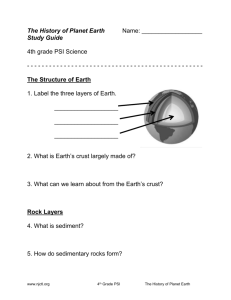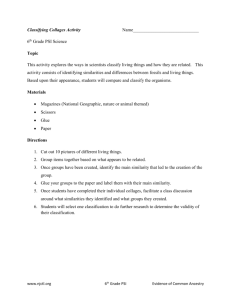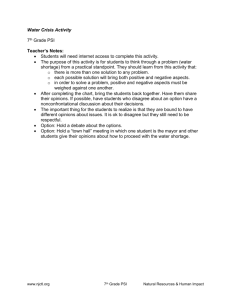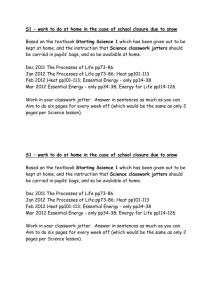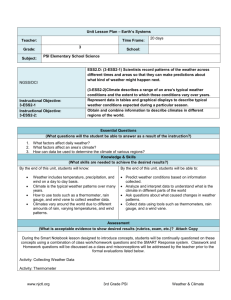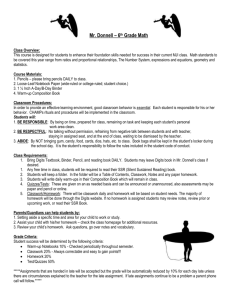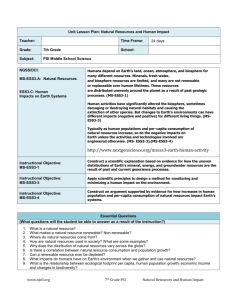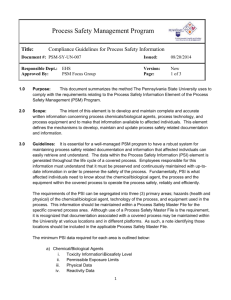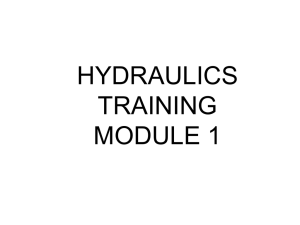converge - New Jersey Center for Teaching and Learning
advertisement
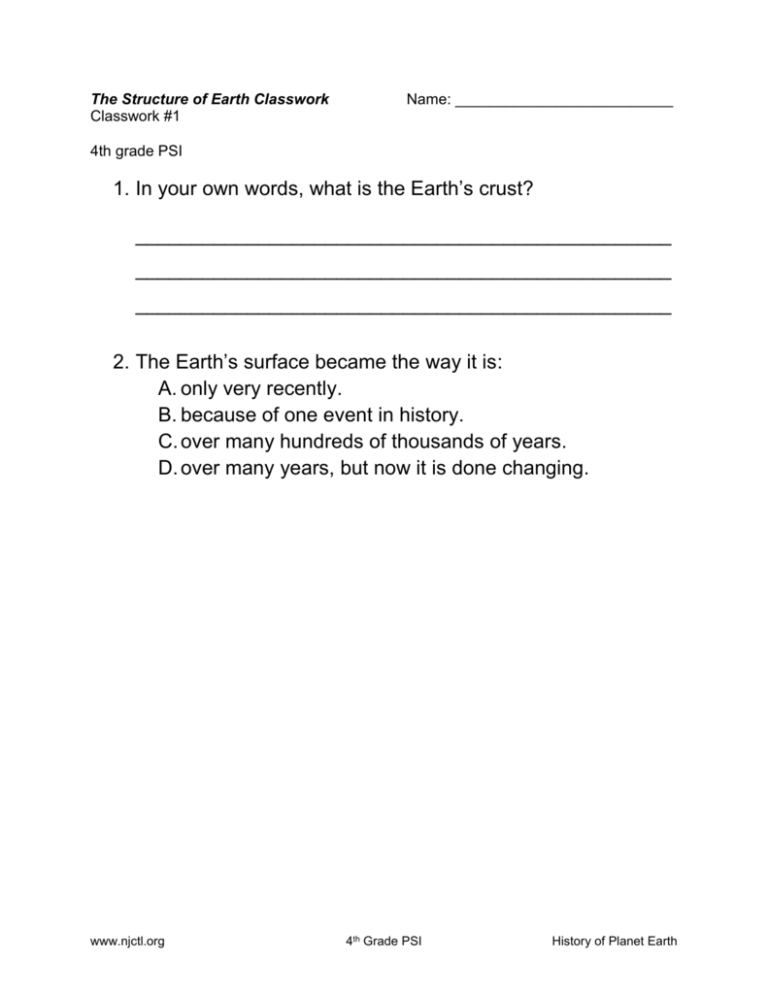
The Structure of Earth Classwork Classwork #1 Name: __________________________ 4th grade PSI 1. In your own words, what is the Earth’s crust? ________________________________________________ ________________________________________________ ________________________________________________ 2. The Earth’s surface became the way it is: A. only very recently. B. because of one event in history. C. over many hundreds of thousands of years. D. over many years, but now it is done changing. www.njctl.org 4th Grade PSI History of Planet Earth The Structure of Earth Homework Homework #1 Name: __________________________ 4th grade PSI 1. Label the three layers of Earth. ___________________ ___________________ ___________________ 2. Geologists study rocks in Earth’s crust to learn about: A. property lines B. history C. languages D. what is happening right now 3. Why do you think it might be important to learn about Earth’s history? (Be as specific as you can.) ________________________________________________ ________________________________________________ ________________________________________________ ________________________________________________ www.njctl.org 4th Grade PSI History of Planet Earth Rock Layers Classwork Classwork #2 Name: __________________________ 4th grade PSI 1. Sediment is: (choose the best answer) A. dirt and rock B. solid materials C. broken up particles that sink in water D. not common in sedimentary rocks 2. In your own words, what does the Law of Superposition say? ________________________________________________ ________________________________________________ ________________________________________________ ________________________________________________ ________________________________________________ www.njctl.org 4th Grade PSI History of Planet Earth Rock Layers Homework Homework #2 Name: __________________________ 4th grade PSI 1. Draw a picture or use words to describe the steps in sedimentary rock formation. If drawing pictures, use labels where appropriate. ________________________________________________ deposition ________________________________________________ sedimentation ________________________________________________ compaction ________________________________________________ cementation ________________________________________________ www.njctl.org 4th Grade PSI History of Planet Earth Fossils and Relative Time Classwork Classwork #3 Name: __________________________ 4th grade PSI 1. What is a fossil? ________________________________________________ ________________________________________________ ________________________________________________ 2. Fossils found in rocks from different time periods look different because: A. fossil deposition is random B. different plants and animals lived at different times C. the same plants and animals have always existed but move around D. the Earth has not changed www.njctl.org 4th Grade PSI History of Planet Earth Fossils and Relative Time Homework Homework #3 Name: __________________________ 4th grade PSI Use the diagram below to answer questions 3 and 4. very long ago 1. You have 2 rocks. In Rock A, you find 3 In Rock B you find 2 recent fossils and one fossil. fossils. Which rock is older? Why? ________________________________________________ ________________________________________________ ________________________________________________ 2. In Asia and South America, rocks have been found with many fossils. Given your knowledge of fossils, how can you compare or contrast these rocks? ________________________________________________ ________________________________________________ ________________________________________________ ________________________________________________ www.njctl.org 4th Grade PSI History of Planet Earth Rock Formation and Earth Forces Classwork Classwork #4 Name: _____________________ 4th grade PSI 1. Rocks that are closer to the surface are always younger than rocks that are deeper down. TRUE FALSE 2. What are some examples of Earth forces that can disrupt the Law of Superposition? ________________________________________________ ________________________________________________ ________________________________________________ ________________________________________________ www.njctl.org 4th Grade PSI History of Planet Earth Rock Formation and Earth Forces Homework Homework #4 Name: _____________________ 4th grade PSI 1. What are tectonic plates? ________________________________________________ ________________________________________________ ________________________________________________ 2. A friend tells you that tectonic plates are like a broken eggshell. Explain this statement. (If you want, draw a picture to help explain.) ________________________________________________ ________________________________________________ ________________________________________________ ________________________________________________ 3. Another friend tell you that tectonic plates are like graham crackers floating on top of yogurt. Explain this statement. (If you want, draw a picture to help explain.) ________________________________________________ ________________________________________________ ________________________________________________ ________________________________________________ www.njctl.org 4th Grade PSI History of Planet Earth Tectonic Plates Classwork Classwork #5 Name: ______________________________ 4th grade PSI 1. Fill in the chart to compare oceanic and continental crust. oceanic crust www.njctl.org continental crust 4th Grade PSI History of Planet Earth Tectonic Plates Homework Homework #5 Name: ______________________________ 4th grade PSI 1. What type of plate boundary does this diagram show? What do plates do at this kind of boundary? ________________________________________________ ________________________________________________ ________________________________________________ 2. What type of plate boundary does this diagram show? What do plates do at this kind of boundary? ________________________________________________ ________________________________________________ ________________________________________________ 3. What type of plate boundary does this diagram show? What do plates do at this kind of boundary? ________________________________________________ ________________________________________________ ________________________________________________ www.njctl.org 4th Grade PSI History of Planet Earth Earth’s Visible Features Classwork Classwork #6 Name: ______________________________ 4th grade PSI 1. Draw three pictures in the boxes below that show three different features you might find on Earth where plates converge. (Think about differences between oceanic and continental crust.) Continental-continental convergence www.njctl.org Continental-oceanic convergence 4th Grade PSI Oceanic-oceanic convergence History of Planet Earth Earth’s Visible Features Homework Homework #6 Name: ______________________________ 4th grade PSI 1. What features would you see on Earth’s surface where tectonic plates diverge? ________________________________________________ ________________________________________________ ________________________________________________ 2. At divergent boundaries, what fills the space that is left by plates pulling apart? Where does it come from? _____________________________ _____________________________ _____________________________ ________________________________________________ ________________________________________________ 3. What is subduction and where does it occur? ________________________________________________ ________________________________________________ ________________________________________________ www.njctl.org 4th Grade PSI History of Planet Earth Patterns of Earth’s Features Classwork Classwork #7 Name: __________________________ 4th grade PSI 1. What does this map of earthquake locations show us? ______________________ ______________________ ______________________ ______________________ ______________________ ______________________ 2. Do volcanoes exist in the same locations where earthquakes occur? Explain. ________________________________________________ ________________________________________________ ________________________________________________ ________________________________________________ ________________________________________________ www.njctl.org 4th Grade PSI History of Planet Earth Patterns of Earth’s Features Homework Homework #7 Name: __________________________ 4th grade PSI 1. Volcanoes form at what type of plate boundaries? ________________________________________________ 2. Circle all of these types of boundaries on this map. www.njctl.org 4th Grade PSI History of Planet Earth Answer Key The Structure of Earth Classwork Classwork #1 1. Answers will vary (outer layer of earth, Earth’s surface, what we see with our eyes, sedimentary rocks, important in teaching us about history) 2. C The Structure of Earth Homework Homework #1 1. crust mantle core 2. B 3. Answers will vary Rock Layers Classwork Classwork #2 1. C 2. Answers will vary, but must have the idea that as you go farther from Earth’s surface, rocks get older and/or as rocks are closer to Earth’s surface, they are younger. Rock Layers Homework Homework #2 1. Answers will vary but should include the following ideas: deposition: sediments are dropped somewhere, from moving to standing still sedimentation: build up in layers compaction: sediments squash layers below as they build up cementation: rocks are hardened, air is squeezed out Fossils and Relative Time Classwork Classwork #3 1. Answers will vary (remains of plants and animals, non-living organisms found in rocks, found in sedimentary rocks) 2. B www.njctl.org 4th Grade PSI History of Planet Earth Fossils and Relative Time Homework Homework #3 1. Rock A is older than Rock B because Rock A contains fossils that are older than Rock B. 2. These rocks must have formed at a similar time in history because they both contain fossils that are similar in age. Rock Formations and Earth Forces Classwork Classwork #4 1. false 2. earthquakes, erosion (wind, water, animals), rivers Rock Formations and Earth Forces Homework Homework #4 1. Answers will vary (pieces of earth crust that fit together, sections of Earth’s surface, thick pieces that float on the mantle) 2. Answers should discuss earth’s surface being broken into pieces that fit together. 3. Answers should discuss how plates float on top of a liquid mantle. Tectonic Plates Classwork Classwork #5 Oceanic Crust under the ocean floor Continental Crust under land masses made of dense rocks made of light rocks, lighter heavy 6 - 47 miles thick about 4 miles thick usually older Tectonic Plates Homework Homework #5 1. divergent boundary, plates move away from one another, new crust is formed 2. transform boundary, pates slide past each other in opposite directions 3. convergent boundary, plates push together, one plate subducts under the other Earth’s Visible Features Classwork Classwork #6 ContinentalContinental-oceanic continental convergence convergence picture should show picture should show oceanic plate subducting mountains forming and mountains forming www.njctl.org 4th Grade PSI Oceanic-oceanic convergence picture should show an ocean trench forming and one plate subducting History of Planet Earth Earth’s Visible Features Homework Homework #6 1. Rift valleys or mid-ocean ridges 2. Magma. It comes from the mantle. 3. Subduction is where one plate sinks underneath another. It happens at convergent boundaries. Patterns of Earth’s Features Classwork Classwork #7 1. The map shows that earthquakes occur on plate boundaries and do not happen in random places across the globe. 2. Volcanoes exist in some locations where earthquakes occur, but not all. Volcanoes are located at converging boundaries while earthquakes can be at any kind of boundary. Patterns of Earth’s Features Homework Homework #7 1. convergent boundaries 2. www.njctl.org 4th Grade PSI History of Planet Earth
